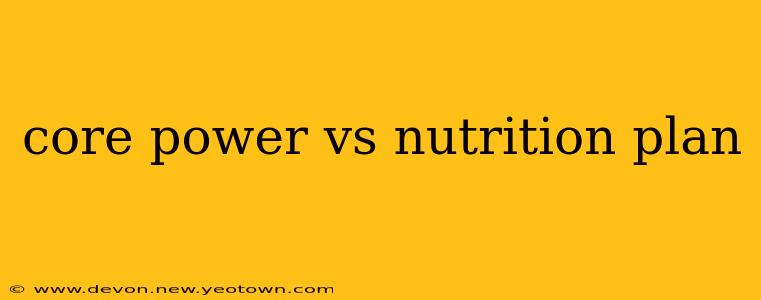The quest for a strong core and a healthy body often leads us down two intertwined paths: building core strength and optimizing nutrition. These aren't separate battles; they're a coordinated campaign for overall well-being. This article delves into the crucial relationship between core power and nutrition, exploring how the right fuel can significantly enhance your fitness goals.
Imagine this: you're diligently working on your planks, crunches, and Russian twists, building impressive core strength. But are you providing your body with the necessary building blocks to support this intense training? That's where the nutrition plan comes in – it's the fuel that powers your engine, helping you maximize results and avoid injury. Let's unpack this vital connection.
What is a Core Power Training Plan?
A core power training plan focuses on developing the strength and stability of your core muscles. This isn't just about aesthetics; a strong core is the foundation for virtually every movement your body makes. It improves posture, balance, and reduces the risk of injury during daily activities and workouts. A well-designed plan incorporates a variety of exercises targeting different aspects of core strength:
- Isometric exercises: These involve holding a static position, like a plank, engaging your core muscles continuously.
- Dynamic exercises: These exercises involve movement, such as crunches, Russian twists, and bicycle crunches, working your core muscles through a range of motion.
- Functional exercises: These exercises mimic real-world movements and translate directly into everyday life, improving stability and power in activities like lifting, twisting, and bending.
How Does Nutrition Support Core Power Training?
The food you eat directly impacts your ability to build core strength and achieve your fitness goals. Your muscles are constantly breaking down and rebuilding, and nutrition provides the essential materials for this process. A well-designed nutrition plan should include:
- Sufficient Protein: Protein is the building block of muscle tissue. Without enough protein, your body won't have the raw materials to repair and rebuild muscles after intense core workouts. Aim for a protein intake appropriate to your activity level and body weight.
- Complex Carbohydrates: These provide sustained energy for your workouts, preventing fatigue and ensuring you can push yourself to your limits. Think whole grains, fruits, and vegetables.
- Healthy Fats: Essential fatty acids support hormone production and overall bodily functions, aiding in recovery and muscle growth. Include sources like avocados, nuts, and olive oil.
- Hydration: Water is crucial for optimal muscle function and performance. Dehydration can lead to fatigue, cramping, and reduced workout capacity.
What are the best foods to support core strength?
This isn't about magic foods; it's about a balanced approach. However, certain foods stand out for their contribution to core strength development:
- Lean Protein Sources: Chicken breast, fish, beans, lentils, tofu provide the essential amino acids for muscle repair and growth.
- Whole Grains: Quinoa, brown rice, oats offer sustained energy to power your workouts.
- Fruits and Vegetables: Packed with vitamins, minerals, and antioxidants crucial for overall health and recovery.
How much protein do I need for core strength training?
The amount of protein you need depends on various factors including your activity level, body weight, and individual metabolism. Consult with a registered dietitian or certified personal trainer for personalized recommendations. General guidelines often suggest 1.6 to 2.2 grams of protein per kilogram of body weight for those engaging in intense strength training.
Can I build core strength without a specific nutrition plan?
You can build some core strength without a focused nutrition plan, but your progress will be significantly slower and less efficient. Without proper fuel, your muscles won't recover optimally, and you'll be more prone to injury and fatigue. A strategic nutrition plan is vital for maximizing your results and avoiding plateaus.
Conclusion: A Synergistic Partnership
Building core power and achieving your fitness goals isn't a solo act; it's a partnership between dedicated training and strategic nutrition. By understanding the crucial relationship between core power training and a well-designed nutrition plan, you can unlock your full potential, achieve optimal results, and enjoy a stronger, healthier you. Remember to consult with healthcare professionals for personalized advice tailored to your individual needs.

